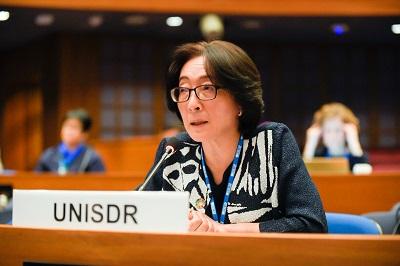
UNISDR head, Mami Mizutori, speaking at this week's 74th UN Economic and Social Commission for Asia and the Pacific (ESCAP)
By Chris Weeks
BANGKOK, 17 May 2018 - Political leaders and senior government officials recommitted themselves to tackling rising inequality across Asia and the Pacific and to improving disaster-related statistics in the region at a high-level UN Policy forum in Bangkok this week.
Over 540 delegates from 44 Member States and Associate Members attended the 74th UN Economic and Social Commission for Asia and the Pacific (ESCAP) session held from 11 to 16 May, the focus of which was the potential impact of deepening inequality on the region’s efforts to push ahead with the implementation of 2030 Agenda for Sustainable Development including the global plan for reducing disaster losses, the Sendai Framework for Disaster Risk Reduction.
Economic losses from disasters are recognized as an issue for some of the ten poorest nations in the region seeking to transition out of the list of least developed countries.
Highlighting the cumulative impact of high-frequency, low-impact events, Ms Mami Mizutori, UN Special Representative for Disaster Risk Reduction told the gathering: “Frequent disasters further deepen such social and economic inequalities by disproportionately affecting children, women and the disabled. This results in a vicious cycle of poverty, inequality and disaster risk.
“This cycle needs to be broken. We need better data on disaster losses, and on social, economic and gender inequality. This data is especially needed at a local level to fully understand the effects of so-called ‘everyday disasters’ if we are to achieve the sustainable development goals.”
Between 2000 and 2015, low and lower-middle income countries in the Asia-Pacific region experienced disaster mortality rates 15 times higher than the region’s high-income countries. Asia-Pacific is also home to two thirds of the world’s poor.
Speaking at the closing, Dr. Shamshad Akhtar, UN Under-Secretary-General and Executive Secretary of ESCAP said: “We cannot allow inequalities to continue widening, as they have done since 2000. The economic and social costs are too high.”
“ESCAP stands ready to provide technical assistance and capacity building on policies and programmes upon the request of our member States, to support regional cooperation on policy coordination to reduce extreme poverty and tackle inequality,” said Dr. Akhtar.